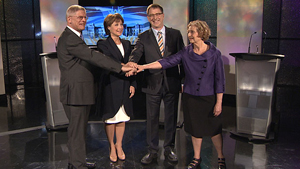
"So where are the strong / And who are the trusted? / And where is the harmony? / Sweet harmony." -- Nick Lowe, "(What's So Funny 'Bout) Peace, Love and Understanding?"
If there's just one thing everyone in British Columbia politics could agree on, it's that we can't be friends.
From business and labour, to environmentalists and natural resource companies, to First Nations, anti-poverty and other groups, it's clear B.C. is definitely not home to sweet harmony.
Confrontation always seems to beat cooperation.
That's why it's so astonishing when something harmonious happens here, and I was fortunate enough to witness it.
On Friday, strong and trusted representatives of all these sectors sat down in the same room to discuss how to improve B.C.'s economy -- to create wealth but also address social equity issues and environmental protection.
Now that's radical! And you know what else is?
Hearing B.C. Business Council CEO Greg D'Avignon state that increasing support for early childhood education is "vital" to the province's success.
Or Vancity Credit Union CEO Tamara Vrooman, a former B.C. deputy minister of finance, telling participants that a business "can have progressive values and prosper" as well.
Or BC Liberal Finance Minister Mike de Jong acknowledging in his opening speech the presence of NDP leader Adrian Dix and NDP MLAs Carole James and Bruce Ralston.
It all happened thanks to Simon Fraser University's Public Square forum, an effort "for enlightenment and dialogue on key public issues."
Busting out of the silos
SFU president Andrew Petter, himself an ex-NDP finance minister, said in an interview after the forum that British Columbians need to "take more responsibility as citizens to resolve issues and not just leave it to the politicians."
"There needs to be more space in this province that's 'neutral ground' not governed by partisan politics," Petter explained. "At a high level, there's consensus."
Petter believes business understands economic growth must accompany improved equality and include environmental sustainability, but that requires dialogue.
"So often in this province we gather in groups of like-minded people in our own silos," Petter said. "We need to create a more collaborative environment, to encourage politicians to be more collaborative."
Was there disagreement in the forum as well as cooperation? You bet!
The rules of participation required that I not quote individuals in order to encourage open discussion, but I can say that there was spirited debate.
And pointed commentary, like when Chief Sophie Pierre, head of the B.C. Treaty Commission, remarked in an open-to-media session that "when a First Nation benefits, the whole region benefits -- but it's not necessarily true the other way."
Or when Yuen Pau Woo, CEO of the Asia Pacific Foundation, said that Vancouver is the "most Asian city outside of Asia" but then added: "There's not that many Asians in this room, by the way."
Sweet, uncertain harmony
But what was most striking is that it wasn't the strident, confrontational or close-minded bluster that often passes for debate in B.C.
Despite being known as a fiercely partisan left and labour supporter, I value good friendships with people from the right and in business -- because we often agree on many things while adamantly but politely disagreeing on others.
I've worked with previous adversaries like ex-premier Bill Vander Zalm on the same side of issues, such as eliminating the Harmonized Sales Tax, building new ferries in B.C. rather than Germany, and not privatizing BC Rail.
The point isn't the issues themselves or that others hold equally strong opposing views; it's that British Columbians with different perspectives can and do come together in common cause, despite the perception that this is a province of many solitudes.
The challenge is to find more issues where we can agree and make concrete progress, such as the need to improve skills training and provide more work for British Columbians -- and not poison the well over points where we can't reach consensus.
Some of the background discussion material produced by SFU show how important that is, from B.C. having the worst child poverty rate in Canada -- tied with Manitoba at 11.3 per cent -- to having the second highest gap between low and high income earners, to having aggregate labour productivity at 10 per cent below the national average, and much more.
The forum demonstrated that people with dramatically divergent views can talk productively about these issues, if only for a day to start. But will anything come of the temporary, uncertain harmony in the room?
That depends. There was consensus that SFU's public square -- or some other body, dare one suggest the province -- needs to do this again soon.
That's a tall order anytime, and especially after a rancorous election campaign, but the startling fact that so many different leaders who never talk could spend a day together in relative harmony -- and want to do it more -- is a promising sign. ![]()
Read more: BC Politics















Tyee Commenting Guidelines
Comments that violate guidelines risk being deleted, and violations may result in a temporary or permanent user ban. Maintain the spirit of good conversation to stay in the discussion.
*Please note The Tyee is not a forum for spreading misinformation about COVID-19, denying its existence or minimizing its risk to public health.
Do:
Do not: